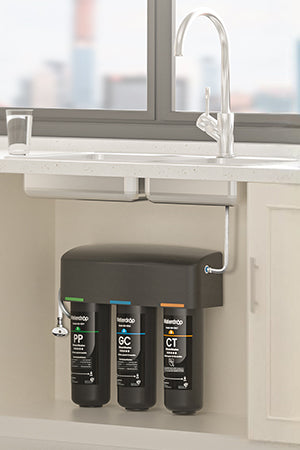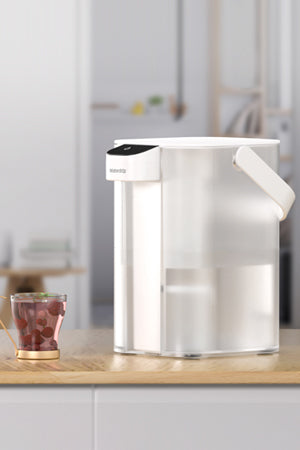Sometimes, all we look forward to is that glass of cold water to refresh ourselves. The craving is even bigger on hot days. But are these cravings good for us? There are many myths and facts surrounding the consumption of cold water. Does it shock your system? Does it impede digestion? Are there any other health risks?
Drinking cold water is generally safe and can help you stay hydrated, especially on hot days. However, in some cases, it may cause mild digestive discomfort or throat irritation.
This article separates the myths from the facts. Read on to get science-backed, well-researched answers to all common questions about drinking cold water.
Why People Are Concerned About Drinking Cold Water
Let’s start by establishing the origin of the debate about cold water. We can trace it back to two sources: tales of the old wives and cultural beliefs. Some cultures believe drinking cold water in hot weather or when eating is harmful.
Others believe it slows down digestion because it freezes the enzymes responsible for breaking down food in the stomach. There’s also a school of thought that suggests drinking cold water causes a sore throat and strains the heart.
What’s the Science Behind Drinking Cold Water?
Does Drinking Cold Water Affect Digestion?
Some people think cold water can throw off your stomach enzymes, making digestion a struggle. Turns out, science says that’s not actually the case.
Researchers have investigated the effect of temperature on the ability of the stomach to process food. In a study published in
the Journal of Gastroenterology , scientists compared how quickly the stomach empties when we drink water at different temperatures.
Water that’s really cold, around 4°C or 39°F, tends to stay in your stomach longer than water at room temperature. However, the difference is not significant enough to lead to digestive problems in healthy people. This is because the stomach warms the cold water to body temperature before it can have any effect.
The body is incredibly efficient at maintaining its internal temperature. Drinking cold water might cause a brief cooling sensation, but it doesn’t significantly disrupt digestion in most people. While it’s possible for people with
irritable bowel syndrome (IBS) and sensitive stomachs to feel temporary discomfort, it hardly happens.
Does Drinking Cold Water Cause Shock?
Cold water shocking the body is another common claim. The idea is that drinking cold water might lower your body’s defenses by putting stress on the immune system. However, there’s no real evidence to support that claim.
In 2024, scientists researched the effects of
drinking cold water during and after exercising . They discovered that the core body temperature drops when people drink cold water at 5°C or 41°F. Hydration also improves, and recovery is faster with no side effects.
The study also established the benefits of cold water for athletes, including the urge to drink more water and preventing dehydration. However, the only time a mild discomfort might occur is when the water is ice-cold, in large amounts, and consumed rapidly. This may lead to what’s called the “brain freeze” sensation.
Does Drinking Cold Water Cause Sore Throats?
There’s also the belief that drinking cold water leads to sore throats or worsens them, perhaps by messing with your immune system. But in reality, bacterial and viral infections are the reasons for the soreness in the throat.
Why Drink Cold Water?
Cold water is not harmful. Instead, it hydrates the body effectively alongside other benefits like:
1. Ensures Hydration
Cold water is great for the taste buds, particularly after a physical activity or when the weather is hot.
The Hydration Foundation discovered that cold water is the go-to for 68% of people over room-temperature water for higher intake. Drinking enough water comes with health benefits like improved mental focus, kidney function, and more.
2. Cools Down the Body
Drinking cold water is an effective way to cool down the body, especially during heatwaves or after exercising. Drinking cold water led to a drop in body temperature by 0.5 °C among participants. This led to less stress and more comfort.
3. Potential Improved Metabolism
People who drink cold water might burn more calories compared to those who drink warm water. Yes, this is a relatively minimal effect. But it’s nice to have for individuals prioritizing effective weight management and hydration.
When Should You Worry About Drinking Cold Water?
We’ve established the safety of cold water. But there are certain cases where it could be a concern:
People with Sensitive Teeth
If your teeth or gums are sensitive, you’re at risk of mild discomfort when drinking cold water. Drinking room-temperature water is advisable in this case. You can also use a straw to drink the cold water in sips.
People with Specific Medical Conditions
Cold water may trigger mild symptoms of severe IBS or achalasia (a swallowing disorder) in people with those conditions. If this is you, please speak to your doctor.
Very High Temperatures
It’s advisable to drink your cold water slowly in extreme temperatures. Otherwise, you may experience stomach cramps when you drink ice-cold water in large amounts.
Room-Temperature Or Cold Water?
Your choice will often depend on your personal preference. Both options keep you hydrated with no major health risks. Specifically, drinking cold water refreshes you, makes you want to drink more, cools you down, and improves your metabolism.
Similarly, room-temperature water is ideal for sensitive stomachs and is an excellent choice for people with certain cultural preferences. The best water temperature is the one that gets you to drink enough. Aim for 8-10 cups daily, regardless of temperature.
Best Practices for Enjoyable and Safe Hydration
These tips will help you maximize your cold water consumption experience:
Filter Your Water Properly: Filtering contaminants from your cold water using a quality filter will ensure safe hydration. We recommend
Waterdrop water filters for home use.
Sip Instead of Gulping: Cold water might be tempting to gulp, but it's better to drink slowly, especially if your water is ice-cold.
Eat Well: Drinking cold water only is not enough. You must combine it with proper nutrition for complete wellness.
Check Your Local Water: Your tap water isn’t always tasteless. Minerals and other additives may alter the taste. But you can improve safety and flavor by using an effective
reverse osmosis water filter .
The Ultimate Truth: It’s Safe to Drink Cold Water
We’ve busted the myth: drinking cold water isn’t bad for you. Scientific investigations and expert opinions have established that it’s safe to drink cold water. In fact, it comes with benefits like body cooling and improved hydration. It doesn’t harm your health, throat, or digestive process.
Although cold water might not be the best for people with specific conditions, it’s perfect for the majority. So, when next you want to have a chilled glass of water, feel free to do so knowing you’re not harming your body in any way. Drink cold water. Stay hydrated. Stay refreshed.





































































